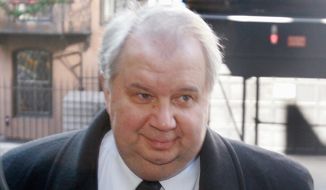Related Articles
By Nikolas K. Gvosdev
Consult any long-term American statistical compilation (say, on the economy or on the crime rate) and one might be forgiven for concluding that the trend lines look quite positive for Americans' sense of security and prosperity.
Shares By Andrei Sushentsov
Russia is the largest country in the world, with very low population density and an intricate interplay of neighbors. Its vast territory makes Russia a self-sufficient universe containing everything it might need for development. On the other hand, low population density and permeability of borders make it internally fragile and heavily exposed to the influence of its neighbors.
Shares By Richard Burt - The Washington Times
After a year or so following the entry into force of the Iran nuclear deal, it is possible to draw some conclusions about the controversial agreement and arms control in general.
Shares By Alexander Maryasov
A year ago, on July 14, 2015, the P5+1 agreed with Iran on the Joint Comprehensive Plan of Action. It was a compromise outlining principles and stages for achieving a comprehensive solution to the Iranian nuclear issue in order to decrease tensions that had been mounting for years.
Shares By Fyodor Lukyanov
The policies of Turkish President Recep Tayyip Erdogan are typically viewed as the determining factor for everything that happens within or in connection with Turkey. And, doubtless, a president with such a single-minded desire for power, glory and a place in history does have a significant impact on a country's course.
Shares By Paul R. Pillar
Turkey once was looked to, with good reason, as a model for the Middle East. It was a well-established republic, more stable and more democratic than much of the rest of that region.
Shares By Timofei Bordachev
One year has passed since Russian President Vladimir Putin and Chinese President Xi Jinping signed a joint statement linking the Eurasian Economic Union (EAEU) and the Silk Road Economic Belt (SREB) on May 8, 2015.
Shares By Paul J. Saunders
The combination of China's growing power with its complexity -- and, indeed its inscrutability to outsiders -- seems increasingly to be transforming the country into a gigantic global Rorschach test.
Shares By Associated Press
It helps to have friends in high places when you're promoting an athletic event.
Shares By Alexander Aksenyonok
Six years ago this spring, the mass protest movement in the Middle East reached Syria. But the Syrian crisis, even though it is part of the disease that has affected the region, is somewhat different.
Shares By Zalmay Khalilzad
The Middle East has been a source of significant security problems whose obvious manifestations are terrorism and extremism. Several factors feed this trend: the crisis of Islamic civilization arising from disagreements over cause of decline since its peak a millennium ago; the sectarianism-fueled rivalry between the three main regional actors--Saudi Arabia, Iran and Turkey; rising ethnic Kurdish nationalism, and the divergent views of current and rising global powers regarding the region's future, and in turn their backing of rival regional powers.
Shares Russia's top diplomat in the U.S. said in a briefing with reporters Monday that relations between Washington and Moscow are in "a deplorably difficult state" and have fallen in recent years to their lowest point since the end of the Cold War.
Shares By Andrei Klepach
The argument that Russia-U.S. trade and economic relations have no solid foundation has long since become commonplace. However, such statements are far from reality. Our business cooperation still has a certain base, since for many years we've been a major importer of US grain and poultry, and these factors have always weighed in on our political relations.
Shares By Dan Russell
Why are international companies still doing business in Russia? Moscow's economic headlines have been downbeat for a year and a half, as the country has been hit by falling oil prices, Ukraine-related sanctions and currency devaluation. Moreover, Russia has long been reputed to be a challenging place to do business.
Shares By Dov S. Zakheim
Even as the Obama administration continues to ponder just how it might respond to the turn of events in Syria in light of Russia's ongoing intervention there, it has studiously avoided addressing a second, far more significant challenge that Russia is posing to the West, that of its nuclear weapons posture.
Shares By Pavel Zolotarev
The aggravation in relations between Russia and the United States weakens the capability of both to confront real, not putative threats. Unfortunately, when observing the development of the situation, one can hardly exclude that the spirit of the Cold War may again set to prevail for quite a long time.
Shares By Peter Prengaman and Nicole Winfield - Associated Press
On his weeklong swing through South America, Pope Francis burnished his credentials as a new kind of pontiff, issuing a searing apology to indigenous people for church crimes more than a half millennium old and even making a pit stop at a Burger King to change clothes and freshen up before celebrating Mass.
Shares By Vitaly Naumkin
The situation in the Middle East is unstable and unpredictable. And one of the dominant trends is the ongoing offensive by radical Islamic and terrorist groups, which are a danger to both Russia and the United States.
Shares Relations between Moscow and Washington are obviously at an all time low due to events in Ukraine and the West responding with sanctions on the Russian Federation.
Shares The State Department on Thursday slammed the Russian government's decision to stop making public its peacetime military casualties, calling the decree a clear attempt by Moscow to hide the deaths of Russian soldiers conducting clandestine operations inside eastern Ukraine.
Shares 


















